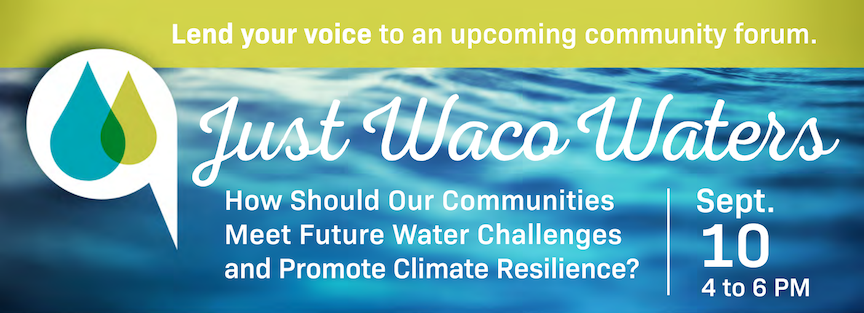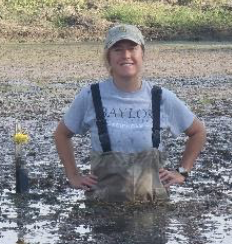Forum to focus on Waco’s water future
By Melissa Mullins
Waco and the suburbs and rural areas in McLennan County are home to about 250,000 people. Our tap water comes from water sources such as Lake Waco and the Trinity Aquifer. Visitors contribute to our tourist economy and may experience the Brazos River downtown. Manufacturing and agriculture are both strong economic sectors for Greater Waco and depend on water. In fact, access to water and sanitation can be considered one of the most basic and fundamental human rights, no matter where you are in the world.
Although water may be a basic human right, here in the U.S. we can point to many examples involving water that demonstrate unfair treatment and access for people in our society. Exposure to lead contamination in drinking water in Flint, Michigan, in 2014 among mostly low-income and minority populations represents one of the best known recent examples of water-related environmental racism in our country.
Hurricane after hurricane in recent years, from Katrina to Harvey to most recently Laura, have shown that flooding disproportionately harms black neighborhoods, and the impacts of floods can exacerbate existing racial and social inequality. And, federal disaster money is not distributed fairly following disasters.

Here in Waco, we have fortunately not experienced a drinking water catastrophe like Flint, and we are too far inland to have major impacts from hurricanes. Many organizations are involved in planning to make sure that all water users in our community have water. However, population growth is expected to continue, and changes in the timing and intensity of precipitation events, flooding, droughts, and extreme heat are likely to be a part of future climate conditions. We may experience changes in water quantity and quality, as well as declining water infrastructure (such as dams, pipes, and treatment facilities).
Our priorities in 2020 have, rightly, been centered on the global coronavirus pandemic, and you may be thinking that issues like water planning can take a backseat. But this year has only highlighted the fact that impacts from the pandemic, like climate impacts and other environmental impacts, are not fair and are not felt equally by all people.
Deaths from COVID19 are much higher among people of color than among whites, and for many, COVID19 has increased the sense that environmental racism and climate change are inextricably linked. The Black Lives Matter movement has named environmental conditions as one of their top concerns for 2020, and 2020 saw a relaunch of the National Black Environmental Justice Network. Water issues are not only environmental issues, they are part of the larger context of our current social and economic realities.
Talking about issues like water, the environment, climate, justice, and economic inequalities can be difficult. How can we all come to the table and engage around these issues in our community?
This summer, the Mayborn Museum and the Center for Reservoir and Aquatic Systems Research at Baylor University received input via surveys and online meetings from people in the Waco community regarding their concerns about water in the future. As an outcome, the Just Waco Waters Forum will be hosted by Mayborn Museum online 4-6 p.m. Sept 10, and you are invited.
The Just Waco Waters Forum has a great line-up of speakers including the Rev. Vernon K. Walker, with Communities Responding to Extreme Weather in the Boston area, as well as local speakers.
Participants will work in small, facilitated groups to voice their thoughts on what we can do to prepare for Waco’s future water challenges. You can register here – space is limited, but all residents of Waco and McLennan County are welcome.

Melissa Mullins is a water educator with the Center for Reservoir and Aquatic Systems Research at Baylor University. Along with a partner from the Mayborn Museum, she is a fellow in the pilot program of the 2020 Public Interest Technology Community Innovation Fellowship. The program trains science-engagement professionals to collaborate with local civic, government, and university partners to engage the public on issues that matter to their local communities.
The Act Locally Waco blog publishes posts with a connection to these aspirations for Waco. If you are interested in writing for the Act Locally Waco Blog, please email [email protected]for more information.

Great article!
Thanks Cari- we are really looking forward to having you participate in the forum!